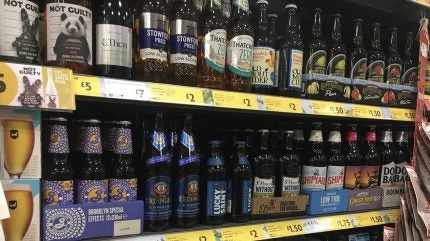
Four in five consumers believe it is more acceptable to buy no- and low-alcohol than five years ago but peer pressure is holding back sales, an international study claims.
Research conducted by Ipsos, the University of Oxford and Heineken says the market is growing but there are “hurdles to overcome”.
A study of more than 11,800 people across the UK, the US, Spain, Japan and Brazil found more than 80% of those surveyed believe drinking no-and-low options is more acceptable than years ago. More than two-thirds (68%) of respondents across the five countries reported they had tried no-and-low products.
Across all of the markets surveyed, 9% of respondents said they associated non-alcoholic drinkers with being ‘cool’ and 25% with being ‘respectable’. Those figures compared to 4% who thought they were ‘uncool’ and 6% who said they were ‘boring’.
“Our research shows that the acceptability of 0.0 beer is at an all-time high,” Heineken chief corporate affairs officer Joanna Price said. “However, social stigmas still hinder our vision that everyone should always have a choice and should not be held back from choosing 0.0.”
According to Prof. Charles Spence, who analysed the research, there remains “a curious gap” between what the public say and do.

US Tariffs are shifting - will you react or anticipate?
Don’t let policy changes catch you off guard. Stay proactive with real-time data and expert analysis.
By GlobalDataSpence, Professor of Experimental Psychology at the University of Oxford, said around one in seven (14%) of respondents stated they always seem to end up drinking alcohol at social occasions despite intending to consume no-and-low options. That figure rises to 51% when including those who said they ‘sometimes’ change their minds in these social settings, he added.
“The results of the study surprisingly show the social pressures in this space are most notably felt by Gen Z, the generation who are arguably most familiar with NAB options,” Spence said.
According to the study, more than a third of Gen Z drinkers have felt pressure to consume alcohol in certain social situations, a level that was the highest of the generations surveyed.
More than one in five (21%) of Gen Z respondents said they had been called out about their choice of a non-alcoholic drink, compared to a generational average of 15%.
“Seeing these social pressures come to the fore in the developed countries surveyed, I believe there is no doubt that people will feel even more stigmatised for opting-out from alcoholic options in other cultures where drinking alcohol is still predominantly viewed as the social norm,” Spence said.
Nevertheless, he added: “It’s clear that the evolution of NAB has reached a tipping point, thanks to wider availability and a more common acceptance of low and no-alcohol drinks in the countries surveyed. In time, this balance will likely show up in wider developing NAB cultures. Adoption of the latest 0.0 products is sure to make its way across borders, and as acceptance of moderation in these developing countries increases, barriers to the growth of the non-alcoholic beverage category will gradually dissolve.”
The study surveyed 11,842 people between 18 and 75 years of age across four countries – the UK, the US, Spain and Japan. It canvassed drinkers between 18 and 65 in Brazil.
Gen Z drinkers were more likely to have tried no-and-low options (73%), with 58% of Boomers having consumed the drinks.
No-and-low drinks were seen as most acceptable in the UK (63%) and least acceptable in Japan (41%).
Heineken said volume sales of its namesake 0.0 product had grown 14% in the first half of 2024. Volume sales were up 3.4% in the third quarter of 2024.
On a call with analysts in October when Heineken published its third-quarter numbers, Bernstein’s Trevor Stirling asked if the brewer believed the slowing growth was a sign of a “permanent change in momentum”.
In response, Heineken CFO Harold van den Broek said: “No, we don’t believe that this is a permanent new trend. We believe that there’s more potential about it. It was indeed a poor quarter. It was singled out in some of the markets, none of which I should bore you with, because, otherwise, frankly, you [would] read too much into this.
“It was just a matter of not being at the right place, at the right time, with the right investment in some of these markets but nothing that structurally worries us. We do believe that this will pick up in the quarters to come.”


